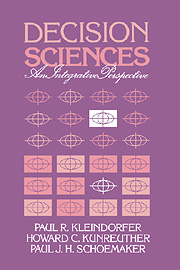Book contents
- Frontmatter
- Contents
- Dedication
- Preface
- Part I Introduction
- Part II Individual decision making
- Part III Multiperson decision making
- Part IV Epilogue
- Appendixes
- Appendix A Expected utility theory with examples
- Appendix B Multi-attribute value functions: the case of certainty
- Appendix C Multi-attribute expected utility theory
- Sources
- Index
Appendix A - Expected utility theory with examples
Published online by Cambridge University Press: 05 June 2012
- Frontmatter
- Contents
- Dedication
- Preface
- Part I Introduction
- Part II Individual decision making
- Part III Multiperson decision making
- Part IV Epilogue
- Appendixes
- Appendix A Expected utility theory with examples
- Appendix B Multi-attribute value functions: the case of certainty
- Appendix C Multi-attribute expected utility theory
- Sources
- Index
Summary
In this appendix we prove two key theorems of the von Neumann–Morgenstern (NM) utility theory, using a numerical example along with the general case. Thereafter various illustrations are offered of how to apply expected utility (EU) theory.
EU axioms and theorems
This subsection states the von Neumann–Morgenstern (1947) axioms and proves that they imply expected utility maximization as the appropriate choice rule. Our approach follows that of Baumol (1977). Lotteries will be denoted as [p: A, B], meaning a p chance of getting A and a (1 - p) chance of getting B. The NM axioms are as follows:
Transitivity: If A > B and B > C then A > C, where > denotes “at least as preferred as.”
Continuity: For any three ordered outcomes A, B, and C, there exists a probability p such that B ∼ [p: A, C], where ∼ denotes indifference.
Independence: For any four outcomes A, B, C, and D, if A ∼ B and C ∼ D then [p: A, C] ∼ [p: B, D] for any p.
Stochastic Dominance: If A > B, then [r: A, B] > [r′: A, B] whenever r > r′.
Reduction: For any alternatives A and B and probabilities p, p1 and p2 [p: [Pl: A, B], [p2: A, B]] ∼ [r: A, B] where r = pp1] + (1 - p)p2.
Information
- Type
- Chapter
- Information
- Decision SciencesAn Integrative Perspective, pp. 402 - 410Publisher: Cambridge University PressPrint publication year: 1993
